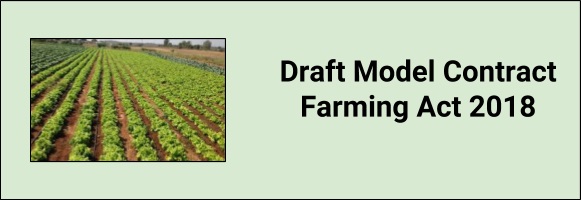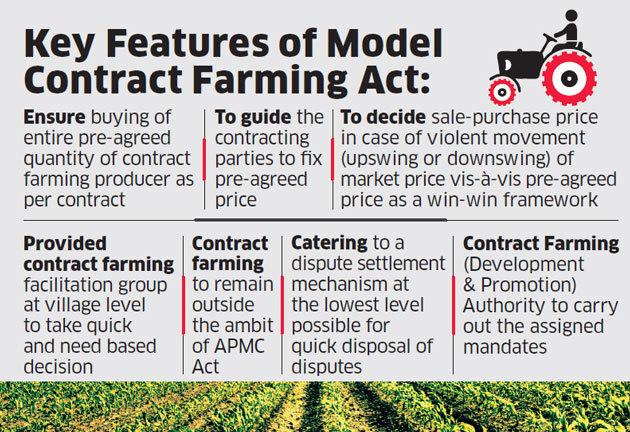Draft Model Contract Farming Act 2018 : Important Topics for UPSC Exams

Draft Model Contract Farming Act 2018 : Important Topics for UPSC Exams
News:
Recently, the Ministry of Agriculture released a draft Model Contract Farming Act, 2018. The draft Model Act seeks to create a regulatory and policy framework for contract farming. Based on this draft Model Act, legislatures of states can enact a law on contract farming as contracts fall under the Concurrent List of the Constitution. In this context, we discuss contract farming, issues related to it, and progress so far
What is contract farming?
Under contract farming, agricultural production (including livestock and poultry) can be carried out based on a pre-harvest agreement between buyers (such as food processing units and exporters), and producers (farmers or farmer organizations). The producer can sell the agricultural produce at a specific price in the future to the buyer as per the agreement. Under contract farming, the producer can reduce the risk of fluctuating market price and demand. The buyer can reduce the risk of non-availability of quality produce.
-
Under the draft Model Act, the producer can get support from the buyer for improving production through inputs (such as technology, pre-harvest and post-harvest infrastructure) as per the agreement.
-
However, the buyer cannot raise a permanent structure on the producer’s land. Rights or title ownership of the producer’s land cannot be transferred to the buyer.
What is the existing regulatory structure?
-
Currently, contract farming requires registration with the Agricultural Produce Marketing Committee (APMC) in few states.
-
Contractual agreements are recorded with the APMCs which can also resolve disputes arising out of these contracts.
-
Further, market fees and levies are paid to the APMC to undertake contract farming.
-
The Model APMC Act, 2003 provided for contract farming, 20 states have amended their APMC Acts to provide for contract farming, while Punjab has a separate law on contract farming.
Buy Printed Complete Study Materials for UPSC IAS PRELIMS Exam
Online Crash Course for UPSC PRE Exam
Issues with the present structure
-
Role of APMCs which are designated as an authority for registration and dispute settlement in most states.
The NITI Aayog observed that market fees and other levies are paid to the APMC for contract framing when no services such as market facilities and infrastructure are rendered by them. Therefore contract farming should be out of the ambit of APMCs. Instead, an independent regulatory authority must be brought in to disengage contract farming stakeholders from the existing APMCs.
-
Provisions of stockholding limits on produce under contract farming
-
Poor publicity of contract farming among the farmers about its benefits.
The model act seeks to address these issues.

The regulations are as follows
-
In draft Model Act, contract farming will be outside the ambit of the state APMCs. This implies that buyers need not pay market fee and commission charges to these APMCs to undertake contract farming.
-
Act provides for establishing a state-level Contract Farming (Promotion and Facilitation) Authority to ensure implementation of the draft Model Act. Functions of the Authority include
-
Levying and collecting facilitation fees
-
Disposing appeals related to disputes under the draft Model Act
-
Publicising contract farming.
-
The sale and purchase of contracted produce is out of the ambit of regulation of the respective state/UT Agricultural Marketing Act.
-
Provides for the registration of contract farming agreements by an APMC.
-
This was done to safeguard the interests of the producer and the buyer through legal support, including dispute resolution.
-
Under the draft Model Act, every agreement should be registered with a Registering and Agreement Recording Committee: will be set up consisting of officials from departments such as agriculture, animal husbandry, marketing, and rural development.
-
Disputes between the producer and the buyer: Under the draft Model Act, in case of disputes between a producer and a buyer, they can:
-
Reach a mutually acceptable solution through negotiation or conciliation.
-
Refer the dispute to a dispute settlement officer designated by the state government
-
Appeal to the Contract Farming (Promotion and Facilitation) Authority (to be established in each state) in case they are not satisfied by the decision of the dispute settlement officer.
-
Stockholdings limits on contracted produce: Under the draft Model Act, limits of stockholding of agricultural produce will not be applicable on produce purchased under contract farming. i.e. It will be out of the ambit of requirements of Essential Commodities Act, 1955.
Concerns:
-
Many industrialists and farmers have rejected the act on various counts like - the core problem of Indian agriculture is the nature of its marketing structure, such as APMC monopoly and restrictions on direct buying from farmers, etc. Removing the restrictions would automatically encourage contract farming but this has not been done. Classic example is dairy sector where private dairies are willing to go directly to farmers as the sector is following a decentralised model, and there is no restrictions on procurement.
-
Contract farming cannot be the driver. It has to be marketing reforms, which will generate a huge amount of backward integration.
-
Farmer unions are also unhappy with the proposed Act: Rather than incentivising farmers with subsidised inputs and procurement at remunerative prices, it talks of incentivising companies. It also has a provision to allow companies to buy produce at lower than contracted prices citing inferior quality
-
Experience has shown that companies keep their quality parameters at such a high level that farmers engaged in contract farming are never able to meet. As a result, farmers lose out in such contracts.
-
If prices rise sharply compared to the contracted price, it will be difficult to force the farmer to sell the produce and such challenges will be difficult to resolve
Way Forward: several other marketing reforms have been suggested by experts should be implemented
-
Allowing direct sale of produce by farmers.
-
Removing fruits and vegetables out of the ambit of APMCs.
-
Setting-up of farmer-consumer markets.
-
Electronic trading
-
Joining electronic National Agricultural Market for the sale of produce.
MODEL QUESTIONS
:: MCQ’s ::
1. With reference to the recently introduced model contract farming act consider the following statements.
A. It allows the centre to frame laws on contract farming bypassing states.
B. It takes the contract farming out of the ambit of APMC's
Which of the above statements are correct?
a. A only
b. B only
c. Both A and B
d. None of the above
Correct Answer: b
:: Mains Questions ::

